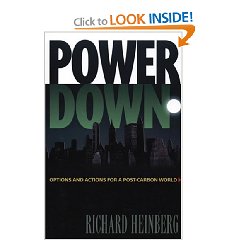The author puts the end of cheap oil in the larger context of other depleting resources (water, ocean fisheries, agricultural resources such as topsoil); population growth; declining food production, global climate change and ecocide; unsustainable levels of US debt; and international political instability.
The author is severely critical of all politicians in general, and brutally scornful of the neo-conservatives that have captured the Bush-Cheney-Halliburton-Exxon Administration (Enron being an invisible partner now). He actually itemizes, rather effectively (a half page for each of the following), what Bush-Cheney have done in eight years that is against the interests of the Republic. According to the author and his sources, they have 1) Stolen an election; 2) placed convicted felons and human-rights violators in positions of power; 3) facilitated 9/11, blocking its prevention, as a means of justifying the war on Iraq and a consolidation of domestic police power; 4) Lied to the American people, the UN, and other publics about Iraq, a war of choice not need; 5) Undermined international law; 5) applied indiscriminate force against civilians in Afghanistan and Iraq, killing tens if not hundreds of thousands; and 6) subverted the US Constitution.
I take the above at face value–it is less of an angry diversion from the book's theme, and more of a critical current assessment showing that in the face of these larger strategic shortfalls that face us, Bush-Cheney were exactly the WRONG way to go. I of course acknowledge that the American people chose to return them to office; hence we get the government we deserve.
Across the book the author takes great care to cite the work of others and point the reader to useful resources. On pages 94-95 he gives us the key seven needs in a powerdown scenario: 1) Stabilize human population; 2) Increase resource efficiency; 3) Shift economics from production to services (including full employment); 4) Reduce pollution; 5) Divert capital to food production (one might add, basic food production like beans, instead of frivolous food production like exotic mushrooms and out of season fruits); 6) Shift agriculture to a sustainable model; and 7) Improve the design of all hard goods to make them durable and repairable.
I am absolutely fascinated with and respectful of the author's focus on Cuba as a model for a powerdown scenario. He does a tremendous job of showing how Cuba adjusted to the US embargoes and the collapse of their Soviet sponsor by going to organic agriculture, mass transit and use of bicycles and animals for much individual transport, and so on. It is be a compelling and fascinating turn of events if the Cuban organic full employment model ultimately triumphs over the immoral profligate US model of consumer capitalism and double deficits (debt and trade). Espero, con respeto, ese dia en el qual Cuba podra declarar su exito moral y nacional.
The other model that the author recommends is the Amish model, where there is a very high reliance on human labor and smart farming without tractors or pesticides.
The author debunks hydrogen as an alternative fuel, points out that hundreds of nuclear plans could be a 50 year solution, but that we will run out of uranium in several decades, and that solar and wind power are now very viable, but will be slow to scale. He emphasizes two aspects of any plausible positive scenario: 1) it will need deliberate commitments at the community level to re-engineer entire counties toward sustainable models, with locally produced food and limited energy demands, massive conservation of water; and 2) it will require considerable government intervention–large scale government intervention.
The author ends with a retrospective on the decline and fall of the Roman and Mayan civilizations. The latter experienced population growth, then tribal fights over scarce resources, a “surprise” drought with cataclysmic impact; and finally, a political leadership engrossed in short-term objectives and unwilling to focus on strategic planning for the long-term. This sounds all too familiar.
A final note that I really admired: the author emphasizes that in the future we will need to return to the employment of “primitive” technologies that are not dependent on fuel, and that there will be a need for a new order of monks or knowledge transmitters, who can re-teach entire generations, entire populations, how to powerdown while ramping up communal agriculture and self-sufficiency.
I will end by saying very candidly that my family is going to cash out of the Northern Virginia area. We are going to sell our home, my office building, and my business, and we are going to move to a community on a robust river in the mountains where communal self-sufficiency can be achieved. This is one of several books that have had a life-altering impact on my family. I do not trust our politicians to be responsible at the federal or state level. I am therefore moving us down to a county-level of personal integrity and interaction, where honor might be assured by a combination of kinship and mutual dependency. I cannot think of a more serious means of ending my review of this book than by stating how it has directed me.





